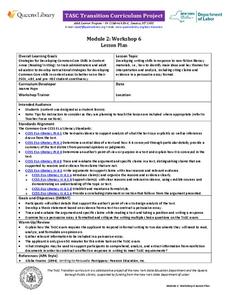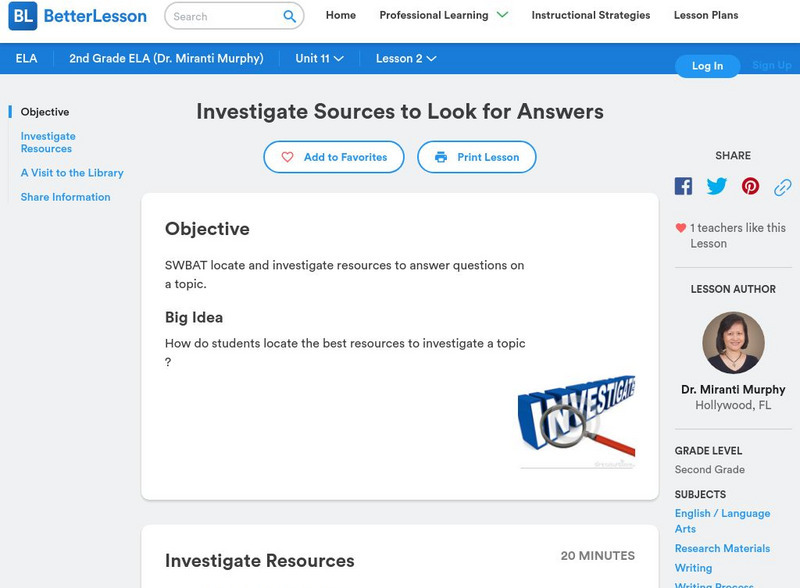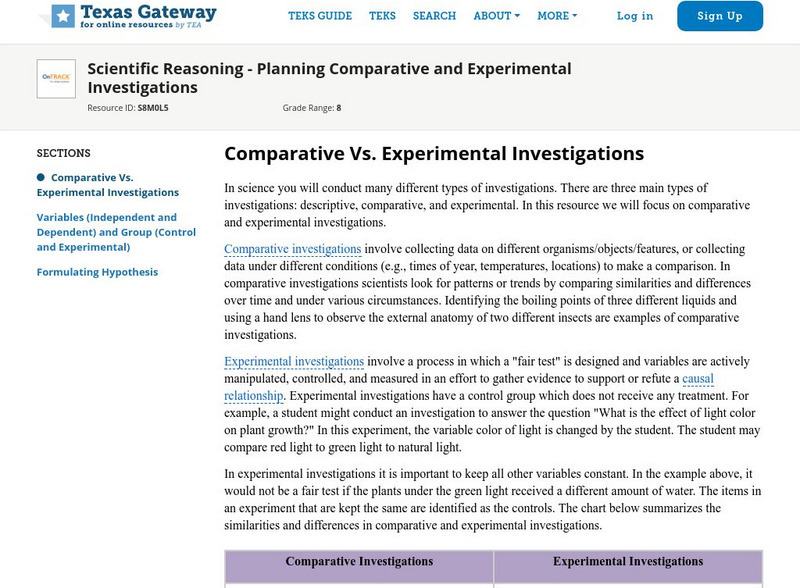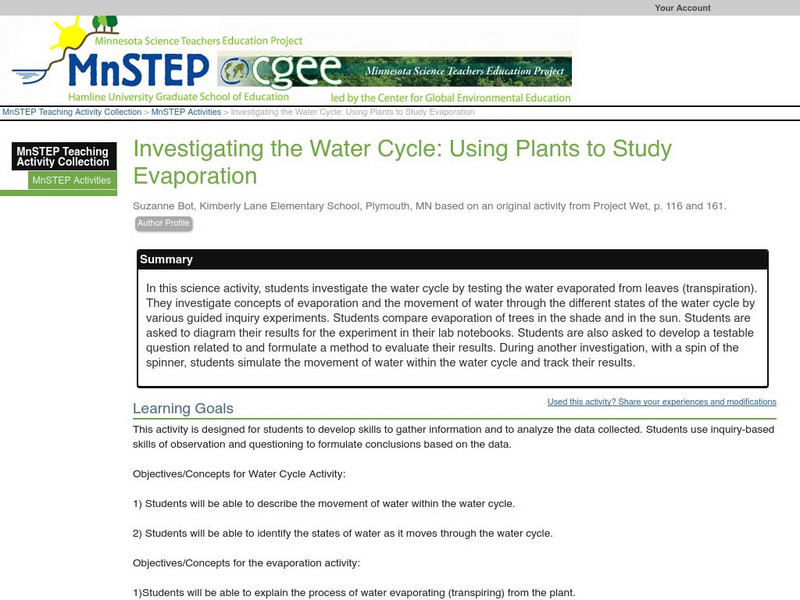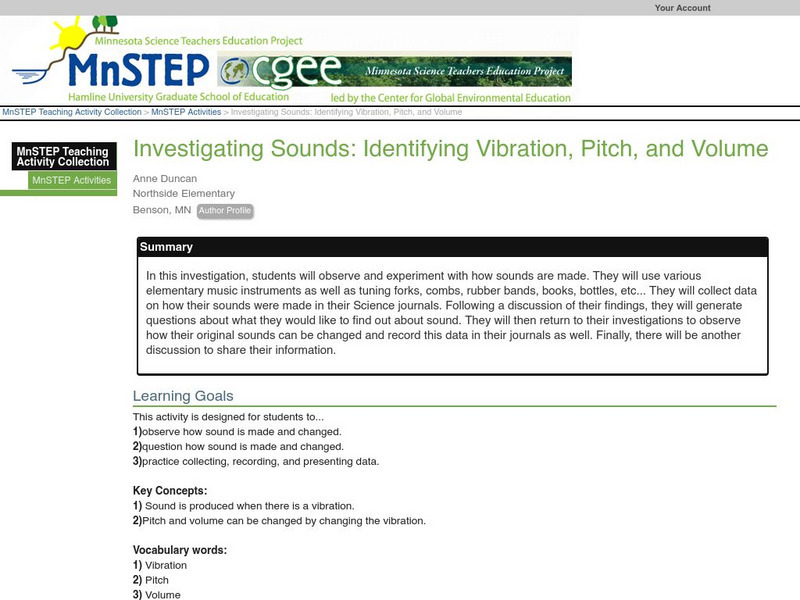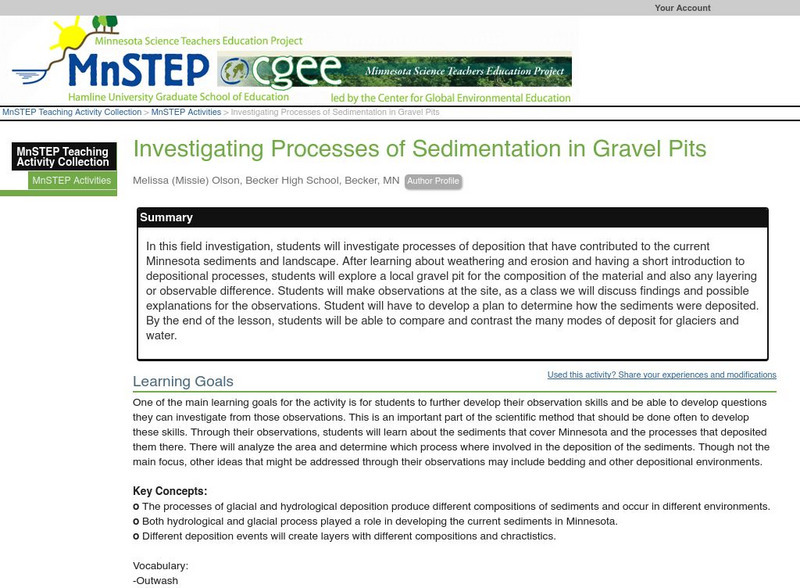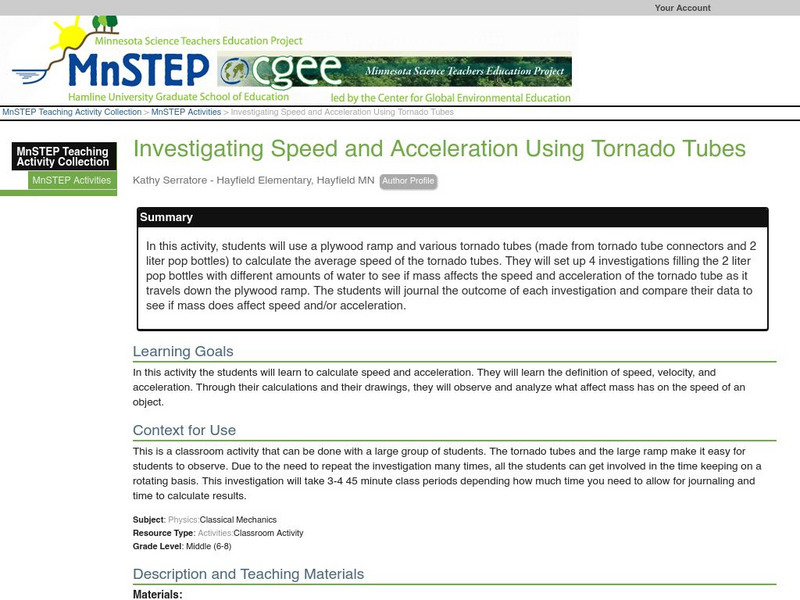College Board
AP® Psychology: Teaching Statistics and Research Methodology
Psychologists use statistics? Scholars investigate the research behind the methodology of statistical analysis. Using hands-on practice, case-studies, and scatterplots, they complete various tasks to understand the very roots of high...
New York State Education Department
TASC Transition Curriculum: Workshop 5
Are video games sports? Pupils investigate this question as well as various nonfiction selections to learn more about claims and the support that defines them. All of the selections mimic the rigor on state tests and encourage close...
EngageNY
TASC Transition Curriculum: Workshop 6
Is a college education necessary for success in today's world? The class investigates the question, along with others at the end of the sixth workshop in a 15-part series. The instructional activity has four parts with multiple...
American Psychological Association
Developing Adolescents
Why to young people act the way they do? Scholars investigate the stages of adolescent development incorporating high school psychology techniques. Using research from the American Psychological Association, they uncover the five areas...
Transforming Education
SEL for Educators Toolkit
Four resources make up the SEL toolkit for educators. Intended for those that teach kindergarten to twelfth grade, helpful files include a companion guide, presentation, reference list, and a one-page snapshot that neatly showcases the...
Texas Education Agency
Texas Gateway: Types of Science Investigations
This tutorial will describe the three types of scientific investigations: descriptive, comparative, and experimental.
Texas Education Agency
Texas Gateway: Descriptive vs. Comparative Investigations
In the following lesson students will learn the differences between descriptive and comparative investigations.
Better Lesson
Better Lesson: Investigate Sources to Look for Answers
Young scholars will practice locating and investigating resources to answer questions on a topic using the FINDS research process. FINDS is an acronym describing its five-step research process: Focus, Investigate, Note, Develop, and...
Texas Education Agency
Texas Gateway: Scientific Reasoning Planning Investigations
Given scenarios of comparative and experimental investigations, students will plan and implement investigations by making observations and asking well-defined questions and formulating testable hypothesis.
Discovery Education
Discovery Education: Science Fair Central: Practice Investigation Virtual Labs
Two virtual labs offer practice for creating your own or science project: "How Does Your Garden Grow" and "Critters!" Learn how investigations are conducted from the first step to the finished product.
Other
Death on a Painted Lake: The Tom Thomson Tragedy Investigations
An intriguing collection of documents and other data relating to the investigations into Tom Thomson's death. Covers investigations from 1918-1978.
Texas Education Agency
Texas Gateway: Investigating Methods for Solving Linear Equations, Inequalities
Given linear equations and inequalities, the student will investigate methods for solving the equations or inequalities.
Discovery Education
Discovery Education: Science Fair Central: Investigation Project Samples
Explore three science fair project samples about birds, stain removal, and keeping it cool. See how the report is written after the investigation is complete.
PBS
Pbs Kids Afterschool Adventure!: Investigating Patterns Activity Plan
Patterns are everywhere! In this week-long learning adventure, children will discover what a pattern is and explore patterns in different ways. Children will learn that patterns consist of a "core" or "unit" that repeats as they identify...
Science Education Resource Center at Carleton College
Serc: Investigating Trees
In this investigation, students will record an observation (drawing) of a tree in their science notebook. Following the observation, students will discuss what they observed and a list will be created by the classroom teacher. Based on...
Pennsylvania State University
Penn State Lehigh Valley: Scientific Investigation
This site presents a general overview of scientific investigation. Content explores what scientific investigation is, as well as the scientific method (the guidelines followed by all scientists).
Science Education Resource Center at Carleton College
Serc: Investigating the Water Cycle: Using Plants to Study Evaporation
In this science activity, students investigate the water cycle by testing the water evaporated from leaves (transpiration). They investigate concepts of evaporation and the movement of water through the different states of the water...
Georgia Department of Education
Ga Virtual Learning: Crime Science Investigation
In this comprehensive interactive tutorial you will learn the basic components of a crime scene investigation and how they are implemented. You will also learn various evidence collecting techniques, as well as how to properly document...
Science Education Resource Center at Carleton College
Serc: Investigating Rotation: Why Is There Day and Night?
In this rotation activity, students investigate what causes day and night by participating in a classroom activity. Students will observe, question, and investigate how the relationship between the earth and sun causes day and night.
Science Education Resource Center at Carleton College
Serc: Investigating South Crow River: Discharge, Turbidity, Erosion, Sediments
In this field investigation, small groups of students will observe and measure characteristics of the South Crow River near Mayer, Minnesota. Data collection on these characteristics will include but not be limited to: speed of current...
Science Education Resource Center at Carleton College
Serc: Investigating Sounds: Identifying Vibration, Pitch, and Volume
In this investigation, students will observe and experiment with how sounds are made. They will use various elementary music instruments as well as tuning forks, combs, rubber bands, books, bottles, etc. They will collect data on how...
Science Education Resource Center at Carleton College
Serc: Investigating Processes of Sedimentation in Gravel Pits
For this field investigation, students will investigate processes of deposition that have contributed to the current Minnesota sediments and landscape. After learning about weathering and erosion and having a short introduction to...
Science Education Resource Center at Carleton College
Serc: Investigating the Rate of Weathering on Various Rock Types.
In this Earth Science field investigation, students will make observations of the rock above and below the Minneopa State Park waterfalls. Students will then make observations of gravestones at Minneopa Cemetery. Through these...
Science Education Resource Center at Carleton College
Serc: Investigating Speed and Acceleration Using Tornado Tubes
In this activity, students will use a plywood ramp and various tornado tubes (made from tornado tube connectors and 2 liter pop bottles) to calculate the average speed of the tornado tubes. They will set up 4 investigations filling the 2...
Other popular searches
- Mathematical Investigations
- Scientific Investigations
- Science Investigations
- Field Investigations
- Hands on Investigations
- Designing Investigations
- Math Investigations
- Conducting Investigations
- Class Investigations
- Crime Scene Investigations
- Pythagoras Investigations
- Water Cycle Investigations


